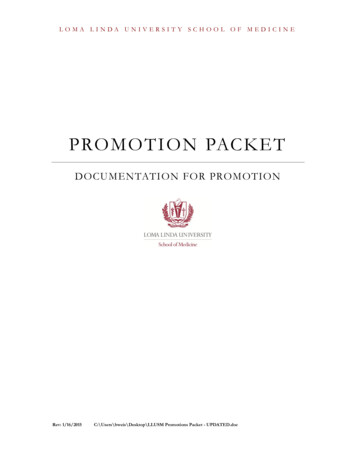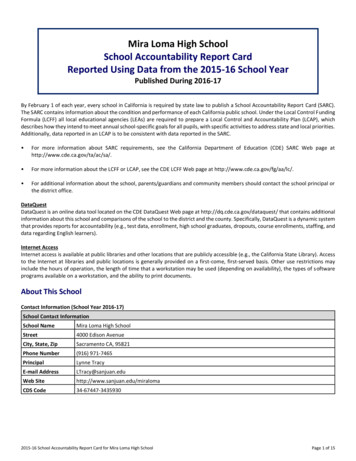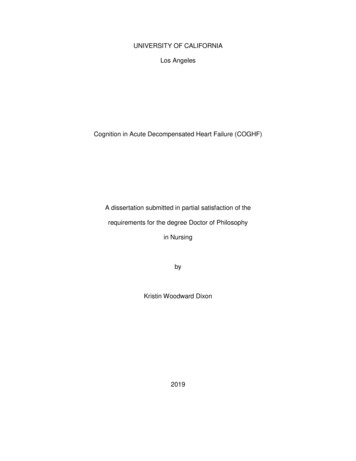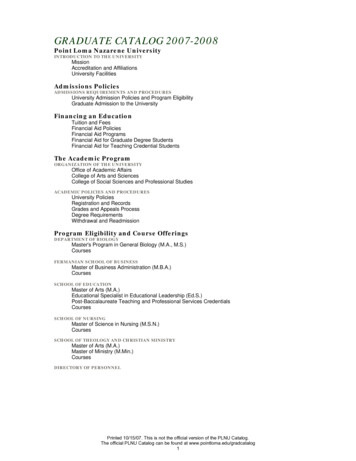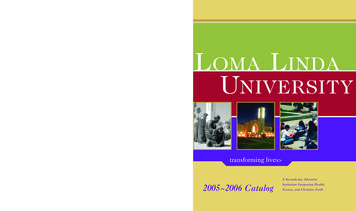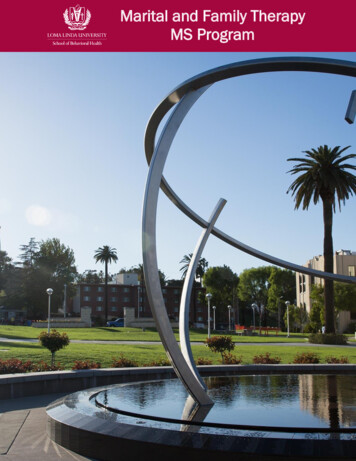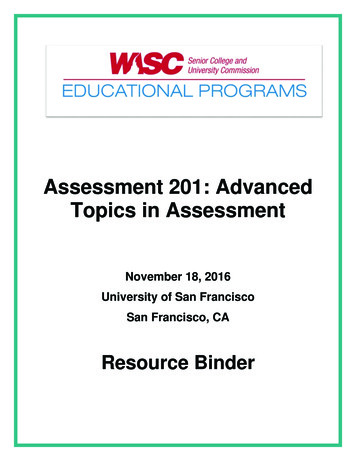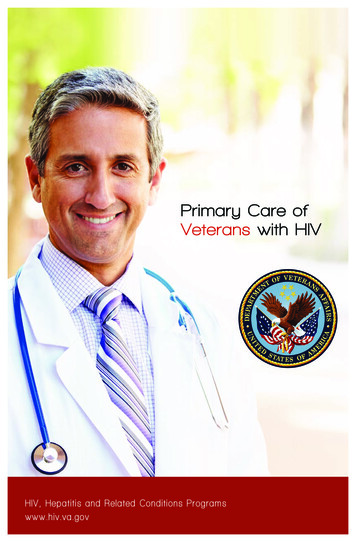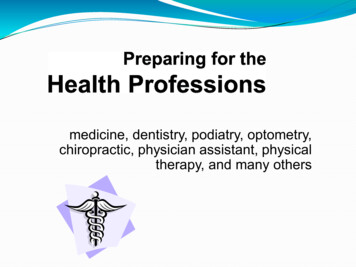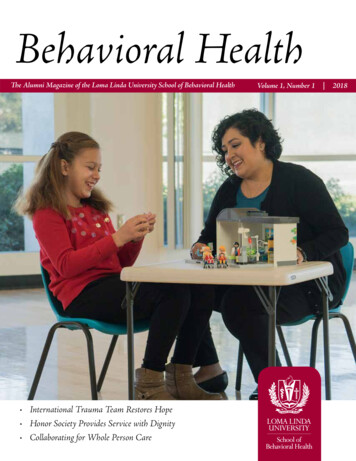
Transcription
BehavioralHealthBehavioral HealthThe Alumni Magazine of the Loma Linda University School of Behavioral Health International Trauma Team Restores Hope Honor Society Provides Service with Dignity Collaborating for Whole Person CareVolume 1, Number 1 2018Behavioral Health 1
CONTENTSDeanBeverly J. BucklesAssociate Dean for Academicand Student AffairsAdam L. AréchigaAssociate Dean for Financeand AdministrationMiriam A. Domingo4International Trauma Team: Restoring Hope Around the World8All in the Family14 Honored Faculty Emeriti:Dianna SimonIgnatius YacoubLouis E. Jenkins16 Helping Families to GetThrough Their Darkest Days10Child Life Program LaunchesCollaboration with China18 Living to Make a Difference19 Integrated CareFocus of Joint BehavioralHealth/School of MedicineInitiative20 Providing CommunityService with Dignity12Going Beyond the Call of Duty22 Student Takes Top Prize inPsychology of ReligionPoster ContestThe mission of the School of Behavioral Health is to provide graduate-level education thatprepares competent, ethical, and compassionate professionals who possess the knowledge, values, attitudes, and skills necessary for a life dedicated to whole person care in behavioral healthpractice, research, and leadership. The School of Behavioral Health is singularly driven by thismission, academically incorporating Loma Linda University’s commitment to the teaching andhealing ministry of Jesus Christ, which produces wholeness within transformed lives.2 Behavioral HealthAssociate Dean for ResearchSusanne B. MontgomeryAssistant to the DeanDiana KruegerDirector of Marketingand RecruitmentTerry ForresterAdmissionsRuth BrowderStudent RecordsJoanna CuadrasAssessmentKaren SaulChair, Department ofCounseling and Family SciencesWinetta A. OlooChair, Department of PsychologyDavid A. VermeerschChair, Department of Social Workand Social EcologyBeverly J. BucklesSchool of Behavioral HealthGriggs Hall11065 Campus St.Loma Linda, CA 92350909-558-1900llualumni.sbh@llu.eduOFFICE HOURS8 am – 5 pm Mon.-Thu.8 am – 2 pm: Fri.
From Dean Beverly BucklesLet’s Stay ConnectedDear Alumni:On behalf of the School of Behavioral Health, I am pleased to share with you the first issue of BehavioralHealth, a semiannual publication designed to provide alumni with up-to-date information about the School ofBehavioral Health regarding innovations in education, practice, research, and global outreach.More importantly, this publication has been intentionally developed to celebrate theaccomplishments of our alumni—who are living to make a difference. So, please contact usat llualumni.sbh@llu.edu and let us know what you are doing! By staying connected, we canalso let you know of events in our School and at Loma Linda University that you may want toattend. Similarly, we would love to hear about opportunities that can be shared with currentstudents. When emailing us please provide a phone number so we can also call you.I hope you enjoy this first issue of Behavioral Health. Among the features in this editionyou will find a brief look at the work of the International Behavioral Health Trauma Team; theglobal outreach of the Child Life Program in China; a look at innovations in integrative care;reflections on emeriti faculty; recognition of the 2018 student honorees; and stories aboutsome of our alumni who have and continue to reach out in extraordinary ways to serve others.The next issue of Behavioral Health is already being planned. To be featured will be an article about theMEND (Mastering Each New Direction) program, which is a family systems-based, psychosocial interventionfor pediatric chronic illness. Dr. Brian Distelberg, Associate Professor in the Department of Counseling andFamily Sciences and Dr. Daniel Tapanes (2016 Alumnus of the DMFT Program, and recipient of the President’s Award) will tell the story of the development and success of this amazing program. Also to be featuredis the research of Dr. Camie Neece, Associate Professor in the Department of Psychology, whose researchaddresses the needs of families who have children with Autism Spectrum Disorder. Dr. Neece has been awarded NIH grants to further her research in the provision of an intervention to reduce parenting stress, lessenparental reactivity and negativity, and decrease child externalizing behaviors. These are but a few of the excitingupdates we will be sharing with you. But the next issue will not be complete without your input. So again,please contact us at llualumni.sbh@llu.edu.Last, but not least, we will also be visiting neighborhoods closer to you. SBH Alumni Meet and Greetevents are being scheduled for this August at several Starbucks locations. Watch our Facebook page and youremail for specifics! Come and have a bite to eat—our treat. I plan to be there and hope you will too.Best wishes,Dr. Bev Buckles, DeanSchool of Behavioral HealthLet’s Connect!Alumni email address: llualumni.sbh@llu.eduAlumni update form: tinyurl.com/sbhalumniSchool of Behavioral Health news page: tinyurl.com/sbhnewsTwitter: @llusbhFacebook: LLUSBHLLUHConnect site: lluhconnect.orgInstagram: @llusbhBehavioral Health 3
International Trauma Team:Restoring hope to people impacted by tragedyThe world’s attention focused on west Africa as adevastating Ebola epidemic swept through the regionfor 21 months beginning in 2014. In one country, Sierra Leone, nearly 4,000 died as the disease rapidlyspread through the population. Even as the horror of the epidemic subsided, those who remained faced significant trauma as theylooked to the future.The epicenter of the outbreak in Sierra Leone was the community of Waterloo, the location of one of the Adventist Health International hospitals (AHI). That hospital, the Adventist Health System, Waterloo Hospital, was commandeered during the pandemicas an Ebola hospital.Collaborating with AHI and the Adventist Developmentand Relief Agency (ADRA), the Loma Linda University International Behavioral Health Trauma Team (LLUIBHTT)was called upon to introduce the Community Resilience Model(CRM) to assist the people of the Waterloo region of SierraLeone with their recovery.Although members of the LLUIBHTT arrived in Sierra Leonenear the end of the Ebola pandemic, team members were aware ofand understood that people of Sierra Leone were also experiencing the cumulative effects of multiple other recent traumatic events(including twelve years of civil war and devastating seasonal flooding). All of these factors added to the impact of the Ebola pandemicwhich touched every household, resulting in entire families dying,homes being burnt, and businesses closing. The people of SierraLeone had truly experienced overwhelming conditions. As such,in planning for the Sierra Leone outreach, members of the LLUIBHTT developed a behavioral health rapid assessment tool thatwas used by AHI leadership to determine the general level of distress of potential program participants who had been asked to bepart the outreach in their communities. As a result of this initialassessment, the LLU team began the program inSierra Leone by providing the forty individualsselected as community participants with a brieforientation to the CRM skills.Although associated with the BehavioralHealth Institute, the LLUIBHTT is administered by the School of Behavioral Health throughthe Dean’s Office. Dr. Buckles, Dean of theSchool of Behavioral Health and founder of theLLUIBHTT provides the primary leadership.“The LLUIBHTT originated following arequest from the Seventh-day Adventist WorldChurch to support the health care providers andteachers living through and providing assistanceduring the conflict in Bosnia and Croatia,” statesDr. Buckles, Dean of the School of BehavioralHealth and leader of the team.“Although the conflict in those countries prevented the team fromserving at that time, it became clear that tragediesFollowing the 2016 earthquake, theLLUIBHTT provided training in Nepal inboth Katmandu and at the SDA ShearerMemorial Hospital to support servicesprovided to survivors.4 Behavioral Health
Where The Trauma Team Has Servedoccur all over the world, and that development of a team of trained experts couldsupport the mission of the Church andLoma Linda University to serve those ingreatest need.” According to Buckles, “Following the inception of the team in 1995,I asked Dr. William Murdoch, now Chairof the Department of Psychiatry, to sharein the implementation of the team’s efforts.LLU has the privilege of having all the behavioral health educational programs andclinical services at one institution that comprise teams of mental health first responders. Since its beginning in 1995 the LLUIBHTT has made over 60 trips to morethan 40 countries. The service we providecontinues to expand as knowledge of theneed of mental health support is betterunderstood and needed around the world.”The services of LLUIBHTT wereoriginally created to provide direct inter-Locations Helped by International Trauma te D’IvoireCubaCuracaoDominicaDominican RepublicEl IndiaIrelandIndonesiaJamaica*JapanLakota NationLaos*Lesotho, South AfricaMalaysiaMexicoNepalNicaraguaNorthern IrelandPakistanPeruPhilippinesRussiaSierra LeoneSingapore*Sioux Nation (Canada)Sri LankaSt Lucia*St VincentSint MaartenThailandTrinidad/TobagoUkraineUS/US nam**Countries served throughregional trainingsBehavioral Health 5
(Top) The LLUIBHTT provided training and direct servicesto support survivors of the devastating mudslides thatoccurred on the border between Haitian and DominicanRepublic.(Above) LLUIBHTT members providing play therapy support for children displaced by the 2005 Venezuelan mudslides.ventions with populations experiencing the effects of disastrous natural and/or manmade events, and to support the efforts of international first responders. At times, these types of responses includingteaching the process and skills of Psychological First Aid are still requested. However, over the years through dialogue with sponsoringorganizations, the LLUIBHTT has demonstrated that its greatestimpact is realized through community capacity building. The servicesnow provided by the LLUIBHTT support the development of resiliency informed individuals and communities as they continue tofocus on cutting edge interventions.“Our function now is to train community members in techniquesthat can be disseminated throughout their communities that make6 Behavioral Healththem more resilient,” said Adam Aréchiga,Associate Dean for Academic and StudentAffairs. “Our goal is to reduce the impact ofmajor trauma on a population and supportthe implementation of effective self-care.Typically, the countries we are asked toserve have very limited to almost non-existent social and mental health systems andprofessionals.”Typically, at a location for a week to tendays, the team provides training, and whenpossible shadowing for trainees within theirown communities. Deployed teams vary insize depending on the outreach event.“Because of the lack of services, the approach we primarily use is to teach self-regulation resiliency skills that are based on the neurobiology of theautonomic nervous system. Our goal is to reduce the stigma peoplefeel from the effects of overwhelming stress following traumatic natural and/or man-made events. We talk about the nervous systemthrough the lens of neurobiology and teach techniques that allowpeople to control how their nervous system activates. The responseto this approach has been very positive. I’ve not found any approachthat works quicker,” Aréchiga said.Financial support for the LLUIBHTT is largely providedthrough reimbursement for services from ADRA, Health Ministries of the Seventh-day Adventist Church, the allocation of indirect funds received through Dr. Buckles’ grants, and donationsmade to LLU to support specific disasters.Following the initial intervention in Sierra Leone, the LLUIBHTT made follow-up visits to Sierra Leone twice in 2016.During the first trip, 22 of the original 40 trainees were selected tocomplete a four-day “Train the Trainer” program. These 22 peoplewere then assigned to train 30 persons each during a five-monthperiod. When the LLUIBHTT returned for a second time in late2016, they found that 822 Sierra Leone residents had been trainedin the basic Community Resilience Model skills. Data from theseefforts demonstrated that those residents had reduced symptomsassociated with depression, anxiety, and post-traumatic stress disorder. A fourth visit in 2017 emphasized working with the Sierra Leone trainers to develop ways of developing fundable services withintheir communities.Though there have been over 60 LLUIBHTT trips, Aréchigasays team members face unique challenges in each trip. For instance,seeing the effects of poverty in countries that struggle economicallymakes a strong impact on team members.“In China we worked with teachers following a massive earthquake,” Aréchiga recalled.“They were digging kids out of the rubble.That was difficult.”“We were in Ukraine when Russia was interfering in the
Crimea peninsula,” Aréchiga said. “Being in an active conflict areawas something I had never experienced.”And, although the purpose of the team does result in membersbeing confronted with the realities of tragedies and difficult situations, team members are also quick to share the extraordinary learning opportunities they have experienced during the team’s journeysaround the world. According to Dr. Buckles, “one of the wonderfulpositive latent functions of the LLUIBHTT has been to give mem-bers meaningful ways to use their professional knowledge and skillsin unexpected and humbling service to others. Many have expressedthat through the Trauma Team they have been able for the first timeto use their behavioral health expertise to serve the Church.”“In Sierra Leone, kids can’t get enough food,” he said. “But eachtime we go back we see how Adventist Health International isworking to improve the infrastructure of the Adventist hospital inthe city of Waterloo.”Trauma Team Members Share Their Memories“My trip with the LLU International Behavioral Health Trauma Team in 2010 to assistthe mudslide victims in El Salvador, made ahuge impact in my life. It solidified my decisionto pursue a career in social work and awakenedmy passion to serve and teach others aboutGod. I saw God’s love and work throughout thetrip. It was an honor to be part of such a wonderful team, I am forever inspired and humbledby this experience. Participating as a part of the LLU Trauma Teamallowed me to work for the Los Angeles County Emergency Outreach Bureau. I am forever grateful for the opportunity that was given to me to be part of the Trauma Team.”Elizabeth Sanchez, 2010 alumna of the MSW Program; clinicalsocial worker for Los Angeles County Department of Mental Health.“Being a Salvadoran immigrant andhaving the opportunity to go back to mynative country to support the survivors andvictims of a natural disaster was one of themost rewarding experiences of my life. Supporting individuals that included children,adolescents, adults, and the elderly undergoing acute trauma in their native languagewas humbling. We worked for several daysproviding the tools to Salvadoran Mental Health professionalsto develop their own Trauma Team. Seeing emotional and professional growth in underserved countries like El Salvador wasabsolutely incredible.”Claudia Reyes, 2010 alumna of the Marriage and Family TherapyProgram; licensed marriage and family therapist and the program manager for the Early Head Start program at Foothill Family.“My work with the Trauma Team has been transformative toboth my personal and professional life. I have met people all over theworld and I am continually amazed by how resilient and giving peo-ple are even in the face of great loss and trauma.Through these experiences, I have developed adeeper sense of compassion, empathy, and appreciation for life. By teaching resiliency skills tocommunities who often do not have access tohealth services, it is my hope that their overallmental and physical wellness is strengthenedand that they will reach out to others who maybe struggling.”Dr. Kimberly Freeman, Professor and Executive Associate Chair,Department of Social Work and Social Ecology, LLU Alumna, Ph.D.in Clinical Psychology, 1999; MSW Program, 2004.“As a member of the LLUIBHTT I’ve beenprivileged to serve others in their greatest need.In turn, I have grown professionally and personally but most significantly, in my walk withGod.”Dr. Winetta Baker Oloo, Associate Professorand Chairperson, Department of Counseling andFamily Sciences, LLU Alumna, MS in Marriageand Family Therapy, 2003; PhD in Marital andFamily Therapy, 2006.“Since its founding more than 20 yearsago, the International Behavioral Health Trauma Team has embodied the mission of LomaLinda University, “To Make Man Whole.” Weare one of several prongs in Loma Linda’sinternational outreach efforts. It’s really meaningful to be a part of this team. I am proud ofthe work we do.”Dr. Adam Aréchiga, Associate Professor andAssociate Dean for Academic and Student Affairs for the School ofBehavioral Health, LLU Alumni PsyD in Clinical Psychology, 2006;DrPH in 2006.Behavioral Health 7
All in the FamilyAnnette Ermshar’s family features generations of Loma Linda graduatesAnnette Ermshar, PhD, is a busy professional who dividesher time between providing psychotherapy to clients inher private practice, conducting psycholegal evaluationsin the jails and prisons, testifying in high-profile forensic cases,consulting for Hollywood screenwriters and producers, and conducting neuropsychological evaluations for children, adolescents,and adults. She has expanded the definition of a working psychologist, and in every arena of her practice, she is committed to excellence, rigorous ethics, and human dignity.Ermshar is part of a multigenerational line of Loma Lindagraduates. Her father and both grandfathers received their MDdegree; her mother a dental hygiene degree, and many cousins andextended relatives have all graduated from Loma Linda University.This close-knit family’s quest for knowledge and high standard forachievement set Ermshar on a path she willingly embraced.“At Loma Linda I enjoyed mentoring relationships with bothDr. Jan Sonne and Dr. Kiti Freier,” Ermshar recalled. “Both wereinstrumental in molding me as a professional and setting the stagefor my future career trajectory. Their commitment to my development was extraordinary and I really value the training I receivedfrom both of them.”Ermshar received a PhD in Clinical Psychology from LomaLinda University in 2000, after having received her BA in Psychology from Pepperdine in 1994. During graduate school, Ermshardeclared a minor in neuropsychology/neuroscience and this specialty has continued throughout her career.“The best advice I can give is to take any and every opportunitygiven to you, as you never know when it will open doors and leadto extraordinary possibilities for the future,” Ermshar said.She went on to complete a Postdoctoral Fellowship in Forensic Psychology at Patton State Hospital. While working at Pattonfrom 2005 to 2014, Ermshar established the neuropsychologicalassessment services program hospital-wide and the PsychologyPracticum Training, supervising more than 120 pre-and post-doctoral students during her tenure.Ermshar went on to additional education, receiving a postdoctoral Master’s of Science degree in Clinical Psychopharmacology. Additionally, she completed the rigorous process of receivingboard certification in forensic psychology by the American Boardof Professional Psychology (ABPP), qualifying her as a Diplomate in Forensic Psychology. Currently, less than 5 percent of alllicensed psychologists are board certified by ABPP, a testamentthat Ermshar is at the top of her profession.8 Behavioral HealthAs a Board Certified Forensic Psychologist, Dr. Ermshar hasserved as an expert witness in numerous court cases within theFederal Court, California Superior Courts, and California Juvenile Court over the past 15 years. She has served as a consultant toboth television shows and motion pictures in the areas of criminalpsychology, neuropsychology and mental illness.Her passion for research has been extensive throughout hercareer. Ermshar was the principal investigator for a large-sale,CA state approved IRB study involving the nature of psychopathy and executive functioning among forensic patients. She hasseveral publications and has recently co-published a chapter in awide-selling book on frontal lobe functioning.In 2002 she started her private practice in Pasadena andnow has several associates and assistants, all providing a widerange of outpatient clinical services. She has inpatient hospitalstaff privileges at a psychiatric hospital in the Pasadena areawhere she sees clients in an inpatient setting, and has been aprofessor at numerous universities, both undergraduate andgraduate, most recently as an associate professor at Alliant International University. She also served as a member-at-largefor the California Psychological Association Board, Division 5in the area of clinical psychopharmacology.Ermshar also co-founded an in-residence psychological treatment center in Pasadena, CA, where she is a co-owner of a pioneering program that specializes in more severe psychiatric conditions, thus bridging the gap between inpatient hospitalization andtransition back into the community.In addition to her clinical work, Ermshar also gives back tothe community through serving as the President of the Foundation Board of Directors for Adventist Health Glendale;Governing Board member for Adventist Health Glendale;Vice-President of the Board for the Pasadena Symphony andPops; Member of the Board of Directors for the Los AngelesMaster Chorale at the Los Angeles Music Center; member ofthe Twilight Club; and member of the Blue Ribbon of the LosAngeles Music Center.“I am committed to and interested in the impact of generosityon physical and mental health and incorporate volunteering, giving back to the community and philanthropic giving to my ownpersonal life,” Ermshar shared. “I feel generosity is so critical for ahealthy person and a healthy community.Between her work and philanthropy, Ermshar enjoys travelingwith her husband, Dan Monahan.
Annette ErmsharBehavioral Health 9
Child Life Program Develops TrainingSession for Visiting Chinese NursesA new School of Behavioral Health program offering pediatricnurses from the People’s Republic of China the opportunity to complete training as Child Life Specialists launched in Fall 2017. The newprogram is an outgrowth of a four-year series of education exchangevisits the School of Behavioral Health faculty members and studentshave made to the Zhejiang University Children’s Hospital (ZUCH),introducing nurses there to the benefits and value of child life services.Nancy Wu is the first ZUCH nurse to enroll in the new program. She has had a strong interest in studying child life approachessince being first exposed to the field during a visit to Seattle Children’sHospital in 2014. She also served as one of the translators for the presentations made there by the visiting Loma Linda University Healthgroups. ZUCH leadership supported her desire to take advantage ofthis new SBH educational program.“There has been a shift in China to becoming more open tofamily centered care,” said Michelle Minyard-Widmann, programdirector for the child life specialist master’s program. “Building ona working relationship that started in 2007, Zhejiang UniversityChildren’s Hospital and Loma Linda have established strong partnerships. It was a natural extensionof that partnership for us to visit and introduce childlife techniques.”Minyard-Widmann and Alisha Saavedra, assistantprofessor, first visited Zhejiang University Children’sHospital in 2014, where they shared the conceptsof family centered care and support for hospitalizedchildren to the nurses there. Those conversations ledto a second visit by SBH faculty and students in Fall2014. The group offered several lectures and hands-ondemonstrations of Teddy Bear Clinics, therapeuticplay with stuffed animals designed to help children understand hospital procedures they faced.Loma Linda students and faculty have returned toZUCH annually.A foundation grant to the ZUCH nursingstaff resulted in initial steps to establish a child lifeprogram there. Currently, there is only one childlife specialist working in the People’s Republic ofChina. Conversations among ZUCH leaders, theLoma Linda University Global Health Institute,SBH leaders, and the LLUCH child life managerled to the creation of this groundbreaking program.“I’ve learned many valuable techniques here,”Wu said. “The type of language used with parentsand children is important. I’ve also learned techniques to guide parents and children through theNancy Wu works with a patient headinginto surgery at Loma Linda University Children’s Hospital. She plans to share her newknowledge with other child life specialistsin China.10 Behavioral Health
procedures they face, and the importance of clearly explainingthe medical technology to help relieve their fears.”Wu is completing the six-month program designed to meetthe specific needs of visiting Chinese nurses. Three months arespent on classroom theory, followed by a three-month internship. The Association of Child Life Professionals, the nationalaccrediting body, is aware of Loma Linda’s efforts and is supportive. Wu passed the Child Life Professional CertificationExamination in late March, and returned to China in April asthe second Certified Child Life Specialist in mainland China.Wu plans to share much of what she learns with the nursing team at ZUCH.“I have much to do,” Wu said. “I will begin training a childlife team of 30 nurses, focusing on the services we can offer. Wecan’t just depend on one or two people. Those 30 nurses will goback to their units and serve as teachers to many more nurses.Nancy Wu came to Loma Linda University Health fromZhejiang University Children’s Hospital in China. Shecompleted her training in Child Life Services in March,and is now serving as only the second Certified ChildLife Specialist in mainland China.Ultimately I hope to encourage Zhejiang University to builda child life degree program.”According to Minyard-Widmann, interest in the program is beyond expectations. Future growth for the programwill be determined by access to internship slots. But the effort is starting strong.“It’s been easy to have Nancy here because she hasembraced the concepts,” Minyard-Widmann said. “Shedemonstrates a fire and a spark that made it easy to bringher here.”Behavioral Health 11
GoingBeyondthe Callof DutyThere is perhaps no greater sense of duty or honor thanin serving our country through military service. Ittakes a unique individual to want to serve and to accept this challenge.Edgard Villa entered the Master of Social Work program atLoma Linda University in January 2016 after realizing that Godwas calling to him to serve those most vulnerable. He had completed an undergraduate degree in Political Sciences at Cal BaptistUniversity but felt a calling to change majors for his graduate work.“I was attracted to study at Loma Linda University becauseof its standing in the community,” Villa said. “Loma Linda University is respected. But it is also invested in the well-being ofthis community.” The School of Behavioral Health’s commitmentto meeting needs in the surrounding communities matches Villa’sdesire to serve others.“The School has opened doors and provided access to organizations in the community I would not have otherwise had,” Villa12 Behavioral Healthsaid. “I was invited to participate in a project operated by the Cityof Riverside’s mayor’s office. On that committee sit representativesfrom CBU, La Sierra University, and Loma Linda University, themayor, and myself. We had several important tasks. Short term,we developed a program to address homelessness in Riverside. Weidentified community resources and their capabilities to meet theneeds of the homeless. We are also planning to provide social support such as case management, social interaction and social reintegration. Long term we hope to help the mayor by developing faithbased supportive housing to meet the basic needs of the homeless.”Villa also completed an internship at the Jerry Pettis Veteran’sAdministration Medical Center in Loma Linda, providing intensive case-management and clinical therapy to homeless veterans.While serving at the VA, Villa was named Student of the Year bythe National Association of Social Workers–California Chapter.A veteran himself, Villa has personal experience with the impact of war. He served in the United States Marine Corps for
Edgard Villa chose Loma Linda University’s School ofBehavioral Health for his master’s studies because ofits longstanding reputation of investing in the well-being of the community.13 years, completing five combat tours — three in Iraq and twoin Afghanistan. Each combat deployment lasted approximatelyeight months.Villa regularly had to deal with mortar and rocket attacks whiledeployed. He lived in constant fear of being injured or killed by improvised explosive devices while on missions. His last unit was with 7thMarine Regiment, an infantry unit where as a Staff Sergeant, he hadthe privilege of leading a platoon of 40 marines and three navy corpsman on combat missions. “It was both the greatest reward and theharshest measure of success that no one was injured or killed duringthis deployment,” Villa said.As a platoon sergeant, Villa was also responsible for living withand training Afghan recruits into becoming soldiers prepared to defend their country. “This was a significant challenge, given the impactof variou
(CRM) to assist the people of the Waterloo region of Sierra Leone with their recovery. Although members of the LLUIBHTT arrived in Sierra Leone near the end of the Ebola pandemic, team members were aware of and understood that people of Sierra Leone were also experienc-ing the cumulative effects of multiple other recent traumatic events
